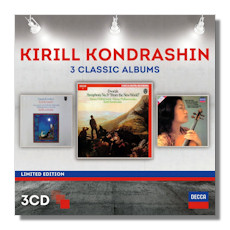
The Internet's Premier Classical Music Source
Related Links
-
Beethoven Reviews
Borodin Reviews
Dvořák Reviews
Rimsky-Korsakoff Reviews - Latest Reviews
- More Reviews
-
By Composer
-
Collections
DVD & Blu-ray
Books
Concert Reviews
Articles/Interviews
Software
Audio
Search Amazon
Recommended Links
Site News
 CD Review
CD Review
3 Classic Albums

- Ludwig van Beethoven: Violin Concerto in D Major **
- Alexander Borodin: Symphony #2 in B minor *
- Antonín Dvořák: Symphony #9 "From the New World"
- Nikolai Rimsky-Korsakoff: Schéhérazade, Op. 35 *
* Herman Krebbers, violin
** Kyung-Wha Chung, violin
* Concertgebouw Orchestra/Kirill Kondrashin
Vienna Philharmonic Orchestra/Kirill Kondrashin
Decca Classics 4786721 3CDs
Although Russian Kirill Kondrashin's most famous recordings are with pianists Van Cliburn and Sviatoslav Richter, he was a gifted conductor who championed a diverse group of composers. A friend of Shostakovich, he was also one of the Soviet Union's most persuasive advocates of Mahler. A nod is given to his gifts as a concerto partner, as well as to his choice legacy on Phillips and Decca. Somewhat shockingly, his London Symphony Liszt recordings with Richter are not here; they have not been endlessly reissued and would have been welcome.
Instead we get his Beethoven Op. 61 with Chung, on what amounts to the final and weakest disc of the set. This may have been the work's first digital recording, but that makes a historical footnote since the performance is lacking. Both sonically and interpretively the outlook is rather harsh. The Vienna Philharmonic sounds either unpolished or disengaged, with many crucial moments coming across as too soft-edged. Chung is naturally a world-class violinist, but she brings neither warmth nor joy to her solo line. While the slow movement is better, it still feels matter-of-fact enough to preclude a positive review. And the concluding Rondo has to be one of the least effective ever, conveying precious little of Beethoven's fire.
Continuing to work backwards, the second disc is infinitely more worthy of consideration. This Schéhérazade ranks among the finest ever recorded, with equal credit owed to the playing of the Concertgebouw and the solo playing of erstwhile Concertmaster Herman Krebbers. Kondrashin tends to focus more on color than sheer excitement here, but that works perfectly fine with this composer. In terms of purely beautiful sound, there are few versions that match this one. Not that it's all dull; there's plenty of heat in the outer movements especially. Still, it never turns vulgar and may not please listeners who expect the piece to steamroll them with intensity. Those who are content to luxuriate in a long-past orchestral sound – the Concertgebouw is great, but doesn't sound like this anymore – will find themselves plenty impressed. As for the Borodin, it's often been coupled with the Schéhérazade, and the main attraction is the Concertgebouw again. Kondrashin certainly likes the piece, but the overall impression is somewhat ponderous, especially when you consider Jean Martinon (also on Decca) who simply attacks the opening bars and never looks back. Still, the Symphony makes a reasonable coupling and still sounds good given the vintage.
Finally, we end at the beginning. Collectors will know the Dvořák as one of the classics among the classics, but new collectors likely will not have heard it. Why? Because this New World has been surprisingly elusive for a recording so praised. Maybe it's less appreciated in the UK, or at international headquarters, but the last time it was released domestically (based on my research of Amazon and ArkivMusic) was 1991. In the 20-plus years since, various series ("Legends", "Originals", etc) have consistently ignored this version. Why is very hard to fathom. Not only is the Vienna Philharmonic in absolutely glorious form – and consider how much better they sound here than in the Beethoven on disc three – but Kondrashin directs with both freshness and excitement. Yes, I'm aware that Decca has some of the great Dvořák New World renditions on their roster, some in Vienna no less, but this is undoubtedly one of the greats and well worth bringing back to circulation. There is an extraordinary dynamic range throughout, as well as a great sense of warmth and personality. At his best, Kondrashin had both, and this set is a fine remembrance, especially for one not generally considered a Decca artist. At this price, you can get the really good stuff and consider the rest a bonus
Copyright © 2014, Brian Wigman




















